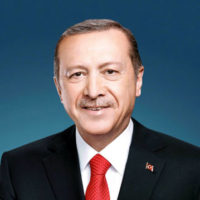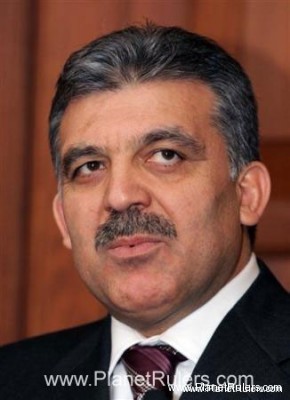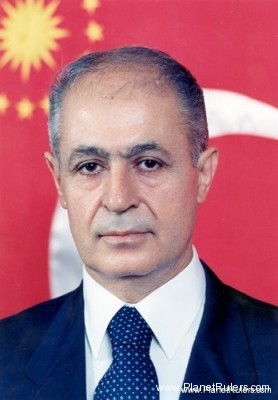Recep Tayyip Erdoğan, Prime Minister of Turkey

Educated in an Imam Hatip school, Erdoğan was a semi-professional footballer playing for Kasımpaşa Spor Kulübü and was involved in Islamist political movements as a student before being elected as the Mayor of İstanbul from the Islamist Welfare Party in 1994. He was banned form office and sentenced to 10 months in prison for religious intolerance in 1998 and later abandoned openly Islamist politics, establishing the moderate conservative AKP in 2001. Winning just short of a two-thirds parliamentary majority in the 2002 general election, the party’s co-founder Abdullah Gül became Prime Minister until his government annulled Erdoğan’s ban from political office. Erdoğan subsequently became Prime Minister in March 2003 after winning a seat in a by-election held in Siirt.
As part of his ‘2023 vision’ for the centenary of the establishment of the Turkish Republic, Erdoğan’s government oversaw accession negotiations for Turkey’s membership of the European Union, an economic recovery following a financial crash in 2001, two successful constitutional referendums in 2007 and 2010, a Solution process with Kurdish militants, an allegedly Neo-Ottoman foreign policy and investments in infrastructure that included new roads, airports and a high-speed train network. With the help of Fethullah Gülen’s Cemaat Movement, Erdoğan was able to curb the political power of the military through the controversial Sledgehammer and Ergenekon court cases. Child poverty rose to 63.5% while Turkey suffered the highest number or workers’ deaths in Europe, with 301 miners being killed in a mine disaster in Soma.
Nationwide anti-government protests broke out in 2013 against the growing authoritarianism of Erdoğan’s government, with an internationally criticised crackdown on protestors by police and AKP youth members that led to 22 deaths resulting in Gülen withdrawing support from the AKP and EU ascension talks stalling. A US$100 billion government corruption scandal in 2013 led to the arrests of Erdoğan’s close allies, with Erdoğan himself incriminated after a recording was released on social media. Blaming the scandal on a coup attempt by a parallel structure formed of Gülen’s supporters in high judicial offices, Erdoğan implemented large-scale reforms to the police and judicial systems that were criticised for placing the judiciary’s independence in doubt. Erdoğan’s government has since come under fire for a crackdown on press and social media, electoral fraud, demeaning the Constitution and alleged human rights violations, having blocked access to Twitter, Facebook and YouTube on numerous occasions. He has come under fire for illegally constructing Ak Saray, the world’s largest palace on Atatürk Forest Farm and Zoo for his own use as President and has advocated an executive presidency system of government that would boost his powers. In 2015, amid consistent allegations that he maintained financial links with Islamic State of Iraq and the Levant militants, revelations that the state was supplying arms to militant groups in Syria in the 2014 National Intelligence Organisation lorry scandal led to accusations of high treason. Opposition journalists and politicians have thus branded him a dictator.
Source: https://en.wikipedia.org/wiki/Recep_Tayyip_Erdo%C4%9Fan
Abdullah Gül, President of Turkey
Sayin Abdullah Gül, GCB, Ph.D (born October 29, 1950) is the 11th President of the Republic of Turkey, serving in that office since 28 August 2007. He previously served for five months as Prime Minister (2002-2003), and as Foreign Minister from 2003 to 2007.
Prime Minister Recep Tayyip Erdogan’s selection of Gül as a presidential candidate drew strong and highly vocal opposition from ardent supporters of secularism in Turkey. In May 2007, Gül’s first bid for presidency was blocked by the Constitutional Court, in a climate of secularist concern regarding views Gül had expressed during his Welfare Party years, and the fact that his wife, Hayrünnisa Gül, wears a headscarf, seen by some as a symbol of political Islam. However, following the parliamentary elections in July the same year, which were won by the AKP with 46.6% of the popular vote, he was eventually elected President on August 28, 2007 and was sworn in the same day, becoming the first former-Islamist President in the modern history of Turkey, which has been described as a “new era in Turkish politics”. In September 2008 he became the first Turkish leader to visit neighbouring Armenia, sparking a major debate in Turkey.
Ahmet Necdet Sezer, Former President of Turkey
Ahmet Necdet Sezer was born on 13 September 1941 in Afyon. He graduated from Afyon High School in 1958.
He graduated from the Ankara University Faculty of Law in 1962 and began his career as a judge in Ankara. Following his military service at the Military Academy, he served first as a judge in Dicle and Yerköy, and later as a supervisory judge in the High Court of Appeals in Ankara. In 1978 he received LL.M. in civil law in Ankara University Faculty of Law.
On 7 March 1983, he was elected as a member to the High Court of Appeals. As he was a member in the Second Chamber of Law, Sezer was recommended to the president by the plenary assembly of the High Court of Appeals among the three candidates for appointment as member of the Constitutional Court. On 27 September 1988, he was appointed by the president as member of the Constitutional Court. On 6 January 1998, he was elected chief justice of the Constitutional Court.
Ahmet Necdet Sezer was elected as the tenth president by the Turkish Grand National Assembly on 5 May 2000 and assumed his duties on 16 May 2000.
President Sezer married Semra in 1964 and has three children.



